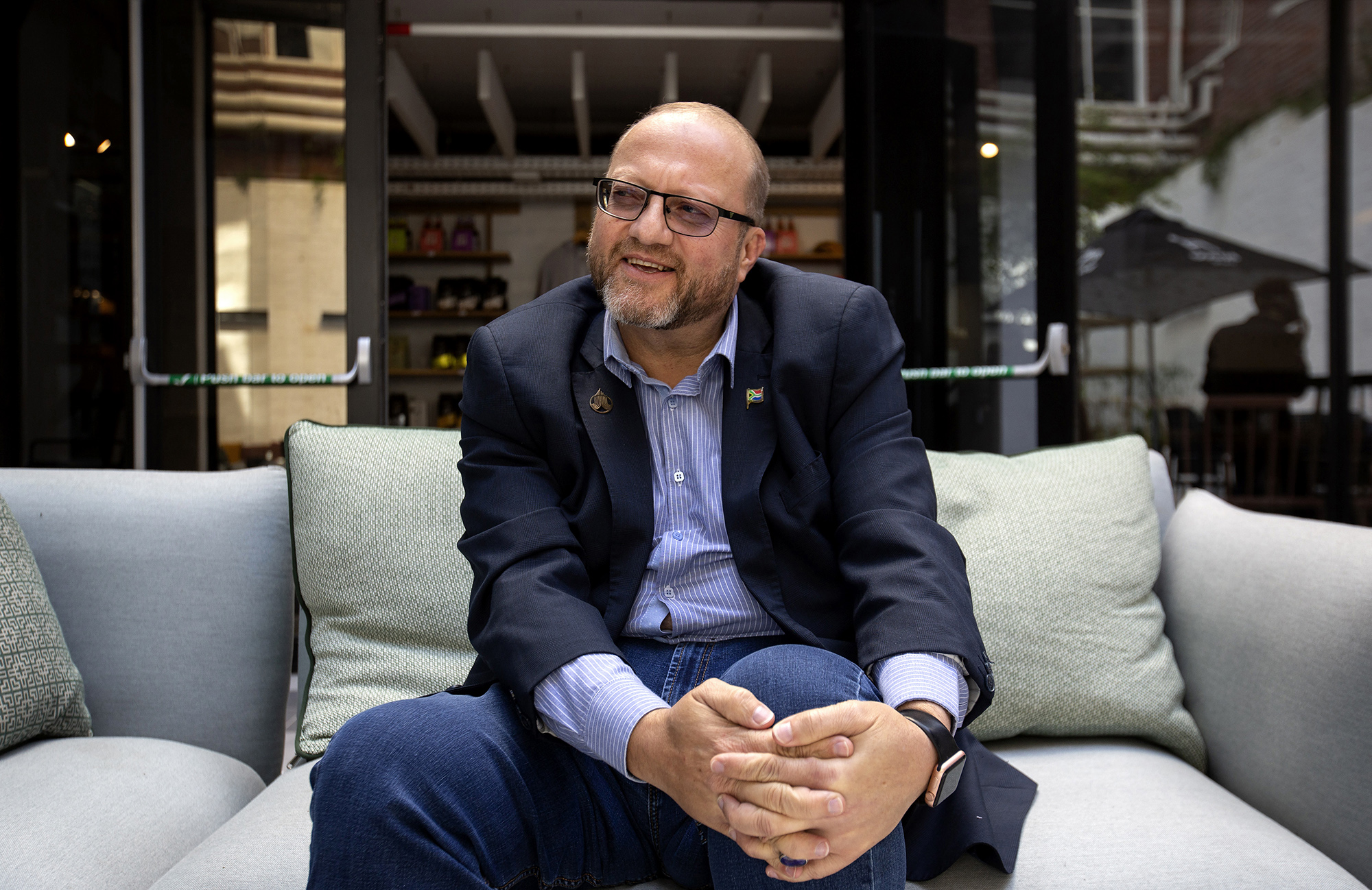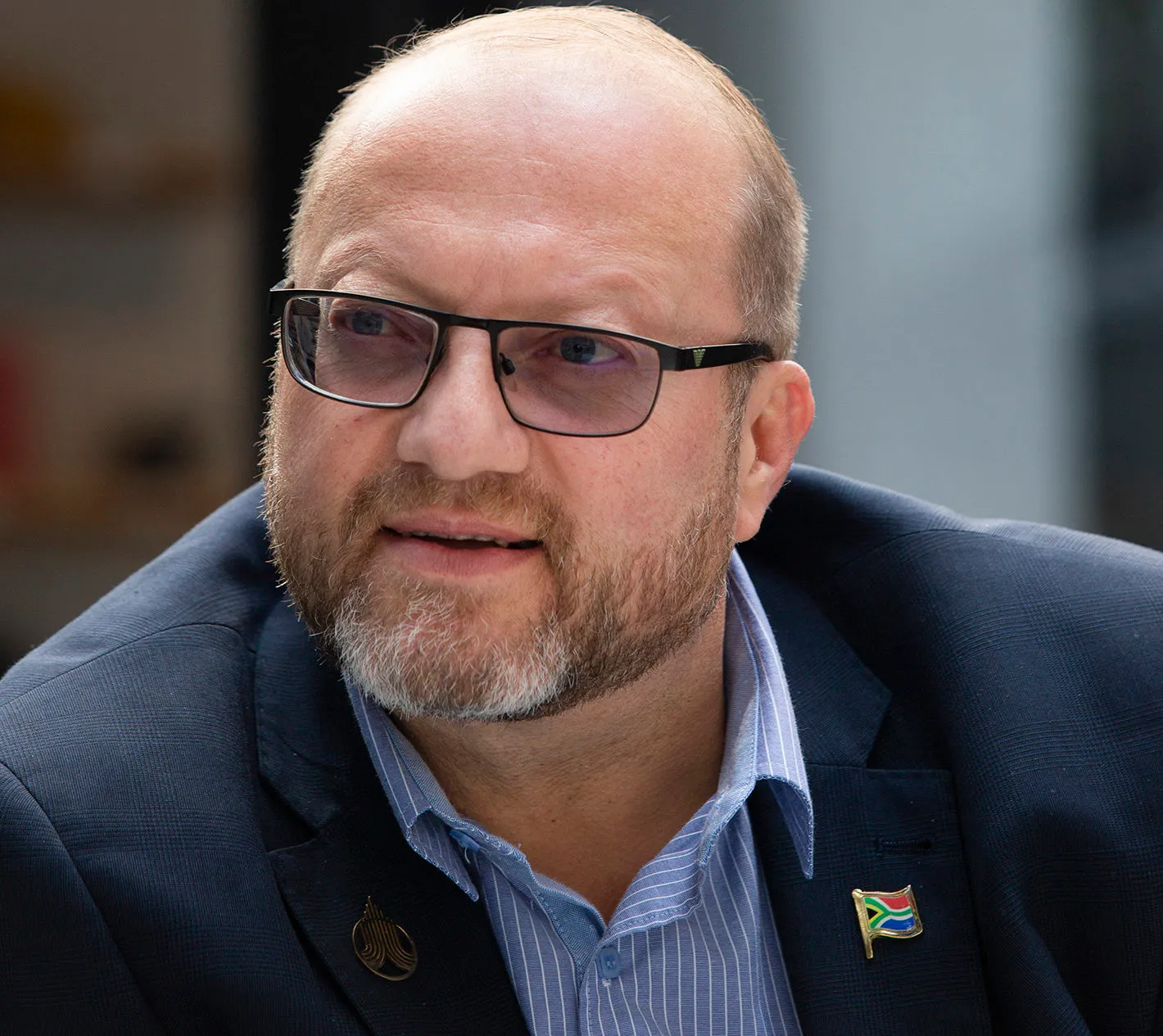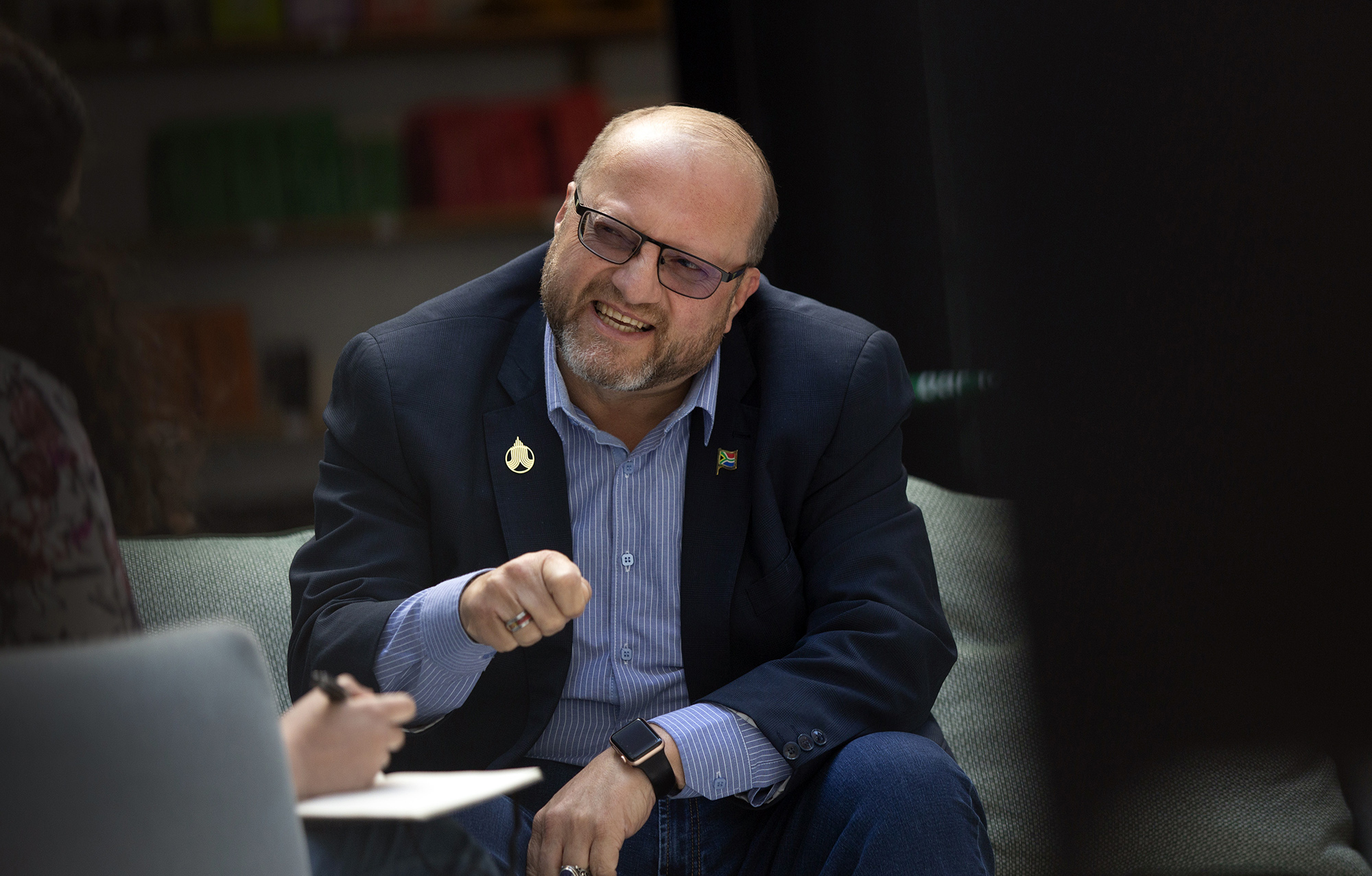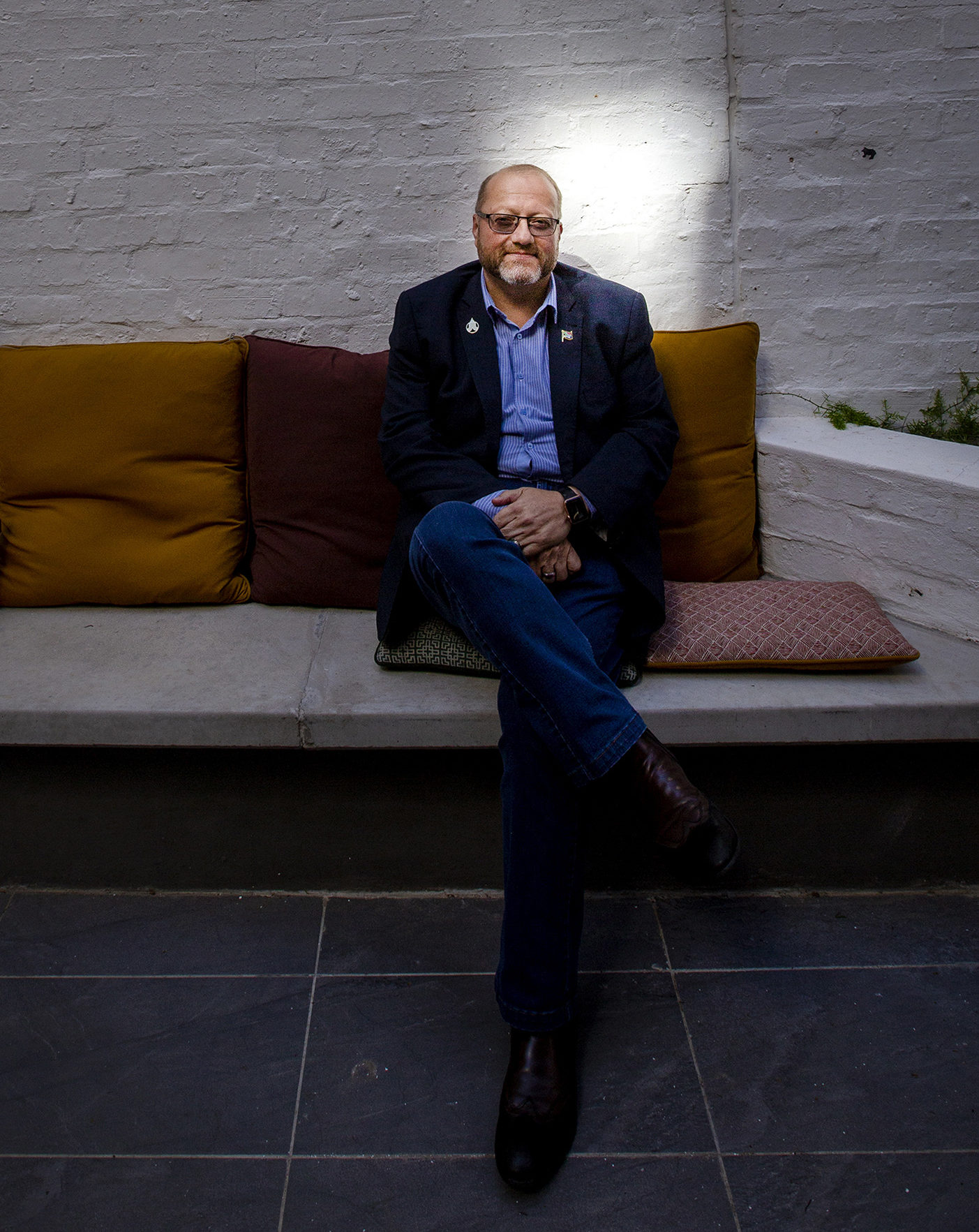https://www.dailymaverick.co.za/article/2020-11-10-neil-de-beer-reinvented-the-bolognaise-loving-ex-anc-spy-intent-on-becoming-south-africas-president/
“I’m 52. I’m going to be the youngest president.”

He speaks so confidently about such mega – almost ludicrously so – aspirations it initially seems as if he’s joking, but it soon becomes clear he isn’t.
In June, the Constitutional Court effectively ruled that independent candidates can stand to be elected for provincial and national elections, not only municipal ones. Parliament was given 24 months to amend legislation accordingly.
“I’m running for the president of the Republic of South Africa. The law says I can,” De Beer says.
He fully believes 2024 – when the next general election will be held – will be critical in determining South Africa’s trajectory.

Daily Maverick interviewed De Beer at a café in Cape Town’s city centre on Monday, the day before he was set to fly to Dubai to speak to expats and reinforce that while they left South Africa, “we didn’t leave you”.
He was accompanied by several bodyguards dressed in black.
De Beer has been in the news after launching the United Independent Movement (UIM), which is not a political party but a grouping that plans to educate South Africans about their right to, among other things, elect independent candidates to office, and for seemingly joining forces with former DA leader Mmusi Maimane and his One South Africa Movement.
Maimane, who was present when De Beer publicly announced his resignation from the ANC at the beginning of October and who also plans to stand as an independent candidate in the 2024 national elections, clarified to Daily Maverick that they had not merged any work and he did not share all De Beer’s views.
Instead, they shared an interest in independent candidates standing for elections.
De Beer seems to have gained support for taking a stand against “agri-violence” (he specifically does not refer to killings on farms as “farm murders” because workers and other employees are also targeted).

He has also made news by taking on and trying to get EFF leader Julius Malema to agree to a public debate on the country’s economy.
But EFF spokesperson Vuyani Pambo told an IOL reporter that Malema would not “legitimise a non-entity, a political chancer”.
On the business front, De Beer runs nine companies, several overseas, with the main one, the Nedebe Group, based in South Africa.
The group’s website says: “We are a [sic] African Business Development consulting agency that brings out positive social and economic developments in South Africa and Africa by forming business ventures and relationships with small and medium enterprises.”
De Beer, who sometimes refers to himself in the third person during the interview, explains that the reason for moving around with bodyguards is that he receives several death threats weekly.
Without going into detail about these, he says someone with true intent to target him would do so without threatening him first. His history hints at the types of opponents he may have accrued over the years.
De Beer was born in Stellenbosch in 1968 and roughly two decades later, in 1987, joined the SA National Defence Force. A year later, the “Afrikaans boy from Stellenbosch” who got involved in apartheid’s security police decided to turn his back on the regime and instead became an undercover intelligence operative for Umkhonto weSizwe (MK).
Some of this history is detailed in the book Undercover with Mandela’s Spies – The Story of the Boy who Crossed the Square by Bradley Steyn and Mark Fine, that shows his MK commanders had included Western Cape police major-generals Jeremy Vearey and Andre Lincoln.
De Beer realised “whites were brainwashed” under apartheid and this is what spurred him to switch sides. He further explains: “Neil De Beer is a normal human being who grew up in an abnormal society.”

His time as an undercover intelligence operative in the 1990s led him into the heart of Cape Town’s underworld and he was involved in a security outfit that was a police front.
De Beer rubbed shoulders with the likes of nightclub security kingpin and intelligence operative Cyril Beeka, who De Beer describes as “a great man, but he stayed in the trenches”.
Beeka, he says, did a lot for the liberation struggle, but has gone down “wrong” in history because he “stayed in the trenches”. De Beer’s time undercover still churns up rumours in certain quarters, with ties to policing and suspected underworld figures, of him being involved in dubious matters.
The first of two main rumours is that he still actually works for the ANC and handlers have planted him in the political arena with an end-goal of boosting the ANC.
“It’s utter rubbish, utter rubbish,” De Beer says. “I’m no longer [part] of any intelligence movement in any matter of the state.”
His last state job ended about two years ago when he resigned as voluntary special adviser to the Deputy Minister of Defence and Military Veterans, an unpaid position that left him bored as he was not given the space to help military veterans as he had planned.
The second rumour of involvement in dubious matters is of him having been involved in the 1994 abduction and murder of Michael Shen, a shark-fin exporter in Cape Town.
A 1994 news article by the South China Morning Post in Hong Kong said Shen was originally from Taiwan and that a group of men posing as police officers had abducted him early in May, and that a fortnight later his body was found with the throat slit.
“Two of five men later arrested were found to be a serving policeman and a prison guard who had allegedly been hired to kidnap and kill the Taiwanese businessman because he had refused to comply with the mafia’s control of the shark-fin market,” the article said.
According to De Beer, Shen was the head of a triad criminal group and involved in crimes involving drugs, shark fins and the import and export of women — in other words, human trafficking.
He says it was discovered that many police officers were working with Shen and were “on his books”.
De Beer says the rumours or claims about his ties to this are simply history and stem from his time in undercover intelligence.
“Every operation you do, it doesn’t always turn out the way it should… It’s an unconventional war,” he says. “The guy [Shen] got taken and told to leave South Africa. Two people within the operation murdered him.”
De Beer does not go into further detail about this matter, saying it was documented decades ago in an 800-odd-page judgment and is history, whereas his focus is on South Africa’s future.
“If there’s one thing I want you to know… I’m a good man.”
Fast-forward a decade from the Shen incident and De Beer was involved in rugby – he was part of the Springbok’s under-21 management team of 2004/2005.
South Africa went on to win the 2005 under-21 Rugby World Championship in Argentina, meaning De Beer was basically part of a globally winning team.
“I’m a life of conundrums,” he says.

When De Beer talks, he often uses his hands to express himself and it’s hard not to miss the two rings he wears – one on each hand.
On the right hand is a thick silver ring with a sizeable blue stone in the centre. De Beer says he bought it in Dubai about three years ago and it symbolises that “we as Africa should be better than Dubai”, especially through making use of natural resources and expanses of seashores and mountains.
On his left hand he wears a thickish band with what at first glance appears to be a pattern on a pale background, but on closer inspection is an image of Jesus. De Beer, a Christian, says he “gave [my] life to God” in August 2020.
At roughly the same time, he says there was increasing pressure on him from an array of people, including some in the business sector, to get involved in a movement to steer South Africa towards a more promising future.
This is what led to the UIM.
The massive difference between apartheid South Africa and post-apartheid South Africa, De Beer says, is that under the previous regime “it was easy to see who the enemy was”.
Since 1994, this was no longer clear-cut.
De Beer says he decided to resign as an ANC member about three months ago, 32 years after joining the party, because “the spirit of [Nelson] Mandela is gone”.
“I’ll always protect the freedom of the rainbow nation,” he says, adding that he will do so even if it means going against others only purporting to do the same. But De Beer will not play “dirty” and does not plan to divulge any ANC “secrets”.
There are three things in life he is sure of – that “you’re going to die in God’s grace”, that you will pay taxes and will have your heart broken several times for various reasons.
“I’m buggered, I’ve given my heart to this country… It’s all or nothing. I’m a cool, calculated human being. I do nothing if I don’t understand why.”
He no longer has a private life and his family has had to take a back seat as he pursues the highest office in South Africa. De Beer is at pains to explain he does not consider himself a politician, but rather an activist. He also does not like being labelled a spy – someone he defines as a highly intelligent individual who extracts information from another person without that person knowing – but rather as a former intelligence operative.
De Beer jokes that if he does indeed become president, his food cravings will dictate his first stop – Wembley Road House in the Cape Town suburb of Athlone.
“The day I’m state president my motorcade will go straight to Wembley,” he says as he laughs.
Throughout the interview, De Beer asks that only two matters he’s spoken about be kept strictly private. Neither has to do with his aspirations or past and one is the secret ingredient to a seven-hour bolognaise sauce he loves making to serve with pasta. He talks about this secret in a conspiratorial hush, head bowed.
Later, adopting a more serious tone again, he says maybe South Africa requires a jolt of sorts and his sheer desire to steer the country could be it.
“I’m going to leave you with this thought,” he says. “Maybe you need Neil De Beer for now.” DM
COMMENTS BY SONNY
LIKE BRAAM FISHER, NEIL DE BEER IS JUST ANOTHER AFRIKANER TRAITOR!
HOW MANY OTHER SA INTELLIGENCE OPERATIVES ARE ON HIS PAYROLL TO TAKE UP HIS CABINET AFTER HIS ELECTION AS PRESIDENT OF SOUTH AFRICA?
WE CAN THINK OF QUITE A FEW.